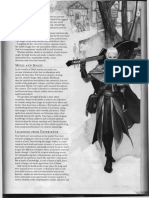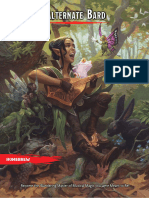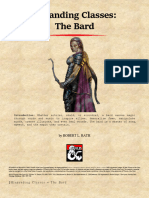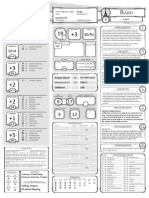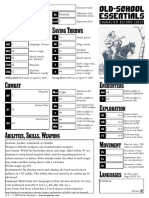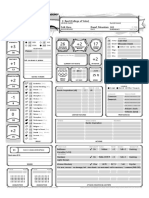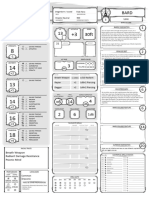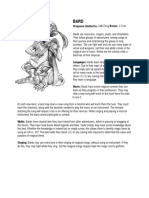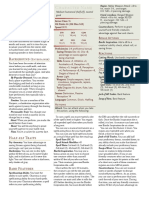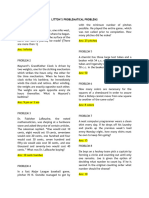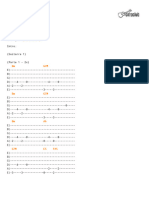SKALDS
Minstrel, harpist, storyteller, bard, skald: they are all aspects of the same group of people which
make their way in the world by the telling of tales and the singing of songs. Rare is the camp or
village where a skald is unwelcome. The arrival of a skald is a treat for most and a few songs at
the tavern (or around the campfire) will often earn him supper and a bunk. Among the tribes,
their skalds sing and play to inspire the warriors in battle.
A surprising number of these entertainers can be found away from the safety of towns and
settlements. Many are simply traveling from one place to the next in pursuit of their trade; others
are looking for a new tale to tell. Often skalds will travel with adventurers in the hopes of
composing a saga about great deeds and mighty battles. Sometimes the skald finds himself more
than just an observer of events!
Master bards who train young skalds make sure that anyone who has completed their
apprenticeship with them has learned at least a modicum of defense. A stout jerkin of leather and
a well-balanced blade; these are as much a part of the skald's repertoire as his harp or voice.
Certain words and sound patterns have power in them and, if used properly, produce magical
effects. Skalds learn some of these "Spellsongs" in their training. The more powerful ones are
learned as the skald's ability advances. NOTE: Skalds must be able to at least sing (in a clear
voice) or play their instrument in order to cast spells. Skalds use the same spell list as Magic-
Users and Elves.
Bardic Immunity: Skalds have another advantage while traveling. In many places -and
sometimes even among the barbarian tribes- the skald's “harp” acts as a badge of safe conduct. It
is widely regarded by many as bad luck to kill a skald. If he does not act in an openly hostile
manner, he may often win his way through unfriendly territory with a song or two, though the
skald's safe conduct may or may not convey to any of his companions!
If he has a musical instrument visibly carried, a skald gains +1 v. monster reactions when dealing
with intelligent humanoids as long as he or his companions do not attack. This bonus increases to
+2 at 4th level, +3 at 8th, and +4 at 12th.
Legend Lore: Skalds also pick up information in their travels and many old songs hold clues to
ancient secrets. Whether it is an ancient saga or overheard gossip in a tavern, skalds can be great
gatherers and sources of information. There is a base 12% chance that a skald will have heard a
rumor or piece of information about a creature, person, place or thing. This chance increases 3%
per level after 1st.
The Prime Requisites for a Skald are CHA and DEX (both 13+ for XP bonus). Skalds fight and
do damage as a same level Thief but lack the backstab ability. They save as the same level Magic
User. Skalds can only wear light armor (padded, leather & studded leather). They use the
Elf/Magic User spell list as well. Skalds cannot use scrolls or other magic items exclusive to
Magic-Users or elves. Skalds' spell books are actually songbooks.
�SKALDS (M-U)
Spells
Level Title XP HD 1 2 3 4
1 Singer 0 1d4 1 - - -
2 Troubadour 4,000 2d4 2 - - -
3 Jongleur 8,000 3d4 2 1 - -
4 Player 16,000 4d4 2 2 - -
5 Chanter 32,000 5d4 3 2 - -
6 Harper 64,000 6d4 3 2 1 -
7 Minstrel 120,000 7d4 3 2 2 -
8 Bard 250,000 8d4 3 3 2 -
9 Skald 400,000 9d4 3 3 2 1
10 Skald 600,000 9d4+2* 4 3 3 1
11 Skald 850,000 9d4+4* 4 4 3 1
12 Skald 1,100,000 9d4+6* 4 4 4 2
13 Skald 1,350,000 9d4+8* 4 4 4 3
14 Skald 1,500,000 9d4+10* 4 4 4 4
*CON bonus/penalty no longer applies
Skald Thief Abilities
Open Pick Move Hide in Hear
Level Locks Pockets Silently Shadows Noise
1 10% 10% 10% 5% 1-2
2 15 20 20 10 1-2
3 20 25 25 15 1-2
4 25 30 30 20 1-3
5 30 35 35 25 1-3
6 35 40 40 30 1-3
7 45 45 45 36 1-3
8 55 55 55 45 1-4
9 65 65 65 55 1-4
10 75 75 75 65 1-4
11 85 85 85 75 1-4
12 95 95 95 85 1-4
13 96 96 96 90 1-5
14 97 97 98 95 1-5
A skald’s music can inspire his companions during a fight. 2/day, for each round a skald sings or
plays to inspire, his allies gain +1 to hit and Morale (up to 3 rounds). This increases to +2 (for up
to 4 rounds) at 4th level. and +3 (for up to 6 rounds) at 8th level. The skald cannot fight or cast
spells while "inspiring." If he wishes, the skald can choose to “taunt” his foes. Instead of his side
gaining a bonus, the skald‘s foes must Save v. Spell or receive a -1 to hit and Morale for 1d3
rounds. This increases to -2 (for 1d4 rounds) at 4th level and -3 (for 1d6 rounds) at 8th level. The
same restrictions apply to taunting as to inspiring (no fighting or casting). This is a non-magical
ability.



